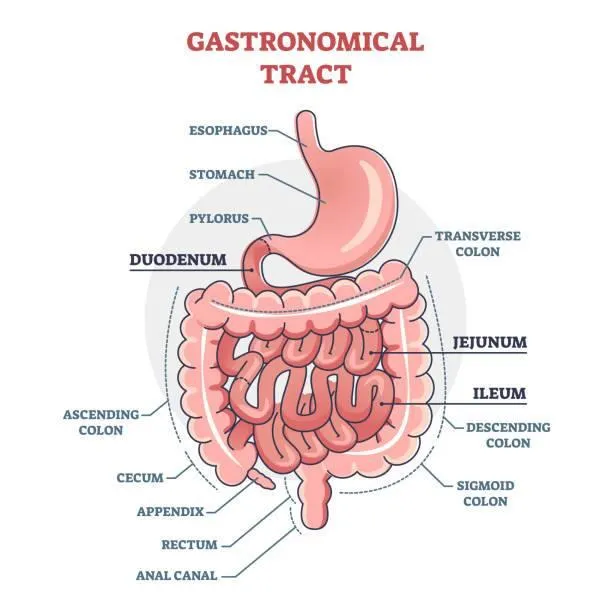Articles

Impact of Colloidal Silver to the Digestive Tract
A couple things one might want to know concerning the digestive system and how it affects oral administration of colloidal silver, heartburn, use of alkaline water, etc.
The stomach empties into the small intestines where digestive acids are neutralized (by the pancreas) and a large amount of moisture (80%) is removed.
The pancreas produces a digestive fluid that contains bicarbonate and enzymes. The bicarbonate is alkaline and neutralizes the stomach acid in the duodenum. The bicarbonate also blocks gastric enzymes that work best in an acidic pH range. The stomach normally has a pH rating of 1-2. Drinking alkaline water does not change your body's pH -- each body system regulates pH uniquely and diet has the largest effect by providing the raw materials utilized in the process. Drinking alkaline water simply makes the stomach work harder to maintain a proper pH level as the water instantly hits acid that is many times more acidic than the alkaline water can impact.
Alkaline water is not the same as water infused with molecular hydrogen (H2). Alkaline water simply has more hydroxide ions than hydrogen ions. While hydrogen ions acts as a antioxidant, hydroxide ions are in fact a source of oxidative stress. Remember that pH is a scale of ratio, not quantity. Every number of the pH scale is 10-fold the prior number where 7 is neutral. So a pH of 2 is 1,000,000 times more acidic than water with a pH of 8 -- meaning there are 1 million more hydrogen ions in stomach acid per every hydroxide ion in slightly alkaline water. That is a lot to overcome to try and change your body's pH.
If you have heartburn, it is usually because the lower esophageal sphincter is not closed. The body requires the stomach to have a pH of 2 or less, in order to close the lower esophageal sphincter. However, many usually take an antacid to address which again causes the stomach to work harder to lower the pH. It is more effective to lower the pH of the stomach back under 2 (hydrochloric acid tablet) to stop heart burn.
The small intestine is the longest part of the GI tract and is where most digestion takes place. What is not absorbed directly into the blood stream in the stomach typically is absorbed by the small intestine.
The small intestine is divided into three parts: Duodenum, Jejunum, and the Ileum (ileum).

When drinking colloidal silver (CS), a large portion of the silver is absorbed into the blood stream through the stomach.
While something like an antibiotic will have a negative effect on your microbiome; because there is a lack of water in the small intestine, forming more of a sludge as digestion takes place, any CS that gets to the small intestine is rendered less effective as it is not as mobile and does not destroy your microbiome -- a good thing.
The small intestine then dumps into the large intestine. The large intestine is responsible for processing indigestible food material and absorbing the remaining water content (18%, 2% is excreted).
The large intestine is divided into 8 parts: Cecum, Appendix, Ascending Colon (travels up on the right side of the body), Transverse Colon (travels across the top of the abdomen), Descending Colon (travels down on the left side of the body), Sigmoid Colon, Rectum, and Anal Canal.
The appendix for a long time was considered a vestigial organ with no function. It is now better understood that the appendix is where the body stores a copy of your healthy microbiome and protects it. If your microbiome is damaged, the appendix can inject a fresh colony of bacteria into your intestine to regenerate the microbiome.
Your blood stream is filtered by both the liver and the kidneys. What is processed by the liver enters the bile ducts and is secreted into the duodenum (small intestine) ultimately to be excreted. Bile itself is necessary for the proper digestion of fats. Try not to have your gall bladder removed which is responsible for storing and concentrating bile.
Your liver will still make enough bile to digest your food, but instead of being stored in the gallbladder, it drips continuously into your digestive system.
Almost all silver that is ingested will be processed out by your kidneys and liver within 24 hours.
Most of the molecular hydrogen (H2) that the body utilizes is produced by the digestive system -- the breaking down of vegetables releases a lot of hydrogen for instance.
Molecular hydrogen not only serves as a source for terminating oxidative reactions, but also serves as a signaling agent responsible for many healthy body processes. Given that molecular hydrogen is essentially two protons bound together, not much can stop it from leaking out of the body. Much of it is expelled through our skin.
One last interesting fact. The liver both stores and manufactures glucose depending upon the body's need. Upon waking, the liver injects a large amount of glucose into the blood stream to provide the body with starting energy. This is why if you test your blood sugar levels after waking up it will measure much higher than when you went to sleep.
It is also one reason that it is not a good idea to eat anything in the morning with a high sugar content as this just spikes your blood sugar levels even higher requiring a larger insulin response to manage. Remember breakfast literally means to break your fast which hopefully started early enough in the evening to give the body time to process activities that only happen when you haven't eaten for a while.
Blessings
Our Mission
Elevate Your Wellness Journey and Take Control with Your Very Own Colloidal Silver.
Copyright© 2025 TechHolistix™ / Silver4Health™ | Privacy Policy | Terms & Conditions
DISCLAIMER: This website, including products, articles, and educational content is not intended to diagnose, cure, or prevent any disease. The information contained on this website is for general educational purposes only. This website does not provide medical advice.

